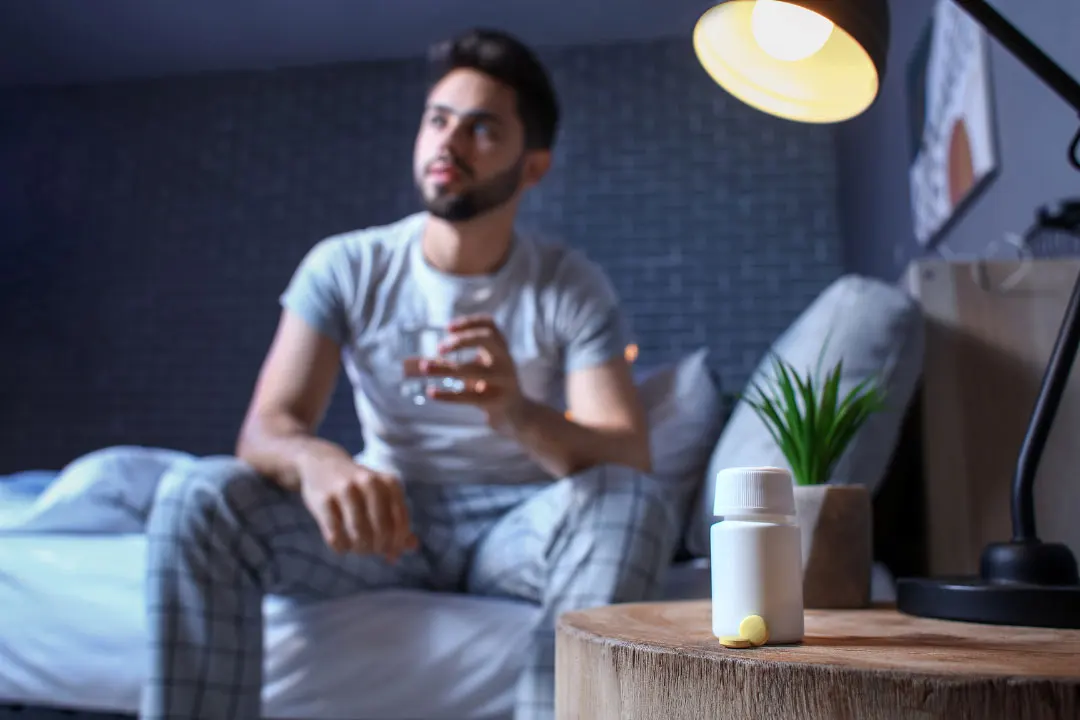Consumers are now seeking natural sleep aids that do not rely on diphenhydramine, a popular OTC sleep aid that may come with unpleasant side effects. We’ll compare two leading brands: Hyland’s sleep aid product (Calms Forte) and DELTA BrainLuxury, so that you can make an informed purchase decision.
For years, consumers have been turning to sleep aids to help manage their sleep after long and stressful days. Experts argue that without adequate sleep, individuals may experience various negative effects, including poor academic performance, low energy levels, depression, and other physical and psychological issues.
However, many over-the-counter sleep aids contain potentially harmful chemicals, as well as artificial flavors and colors. These medications often carry a high risk of dependency, reduced effectiveness over time, potential interactions with other medications, and the risk of overdose.
You May Also Like:
Adaptogens For Sleep: Better Slumber… Naturally
The Best Nootropics for Sleep: 5 Top Brands Reviewed
The problem with diphenhydramine
Diphenhydramine (DHP) is a prominent active ingredient found in many over-the-counter sleep aids. According to the Journal of Pharmacokinetics and Biopharmaceutics, the body flushes out most of the active ingredients present in DHP-containing medications, as it is unable to absorb them effectively.
One study has linked DHP to “an increased risk of cognitive decline,” while another researcher suggests that high doses of DHP have “hallucinogenic side effect[s],” which have been associated with suicide and other drug-facilitated crimes. While many of these claims are still being investigated, several sleep aids contain DHP in small amounts, asserting that it is only toxic in high, regular doses.
In response to the growing body of research surrounding potentially harmful ingredients like DHP, many nutritional supplement companies now offer sleep aids that exclude DHP and barbiturates; these supplements primarily focus on promoting relaxation and supporting overall brain function.

The branding difference:
Hyland’s sleep aid vs DELTA BrainLuxury
Hyland’s Naturals is a company “rooted in nature,” committed to using all-natural ingredients. Their product, Calms Forté, claims to provide temporary relief from occasional sleeplessness and restlessness. This product focuses on calming nervousness and anxiety, which are often factors that hinder sleep. It is paraben-free with no artificial flavors or dyes. Produced in a U.S.-based current Good Manufacturing Practice (cGMP) facility, it is also free of peanuts, tree nuts, soy, wheat, milk protein, eggs, fish, and shellfish.
On the other hand, BrainLuxury is a nutritional supplement company that prioritizes optimizing brain function. Their products aim to support “natural deep sleep, focus, and creativity.” BrainLuxury products contain no animal derivatives, added sugar, flavors, or preservatives. Moreover, they substantiate their products and claims with extensive third-party research and testing.

The ingredients:
Hyland’s sleep aid vs DELTA BrainLuxury
Hyland’s sleep aid, Calms Forté, contains a long list of active ingredients that focus on calming stress and nervousness. However, most of the ingredients in Hyland’s sleep aid are vitamin and mineral-based pain relievers, with limited scientific evidence supporting their ability to promote a good night’s sleep.
One of the first ingredients listed, Avena sativa, commonly known as oats, demonstrably helps calm stress and is currently being studied for its potential mood-enhancing effects. Another active ingredient, Humulus lupulus, also known as hops, has a sedative effect but shows poor efficacy. Hyland’s sleep aid also contains Passiflora, or passionflower, which has been used for centuries to treat anxiety and insomnia; the National Library of Medicine still considers it an “appropriate sleep inducer.”
In comparison, DELTA BrainLuxury is packed full of essential oils, amino acids, vitamins, and minerals that support not only sleep function but also overall brain and body function. This product aims to nourish the brain instead of blocking its natural signals. Numerous studies have demonstrated the efficacy of the ingredients found in DELTA BrainLuxury, which all work to support sleep and brain function.
Medium Chain Triglycerides (MCT), one of the active ingredients in DELTA BrainLuxury, is a fatty oil derived from coconuts. This ingredient has been shown to reduce insulin spikes resulting from high sugar or carbohydrate intake. Another active ingredient, Docosahexaenoic acid (DHA), is a long-chain polyunsaturated fatty acid that, according to a study conducted by Jolanta Pekela et al., impacts brain tissue development and promotes retina health. DELTA BrainLuxury also contains Eicosapentaenoic acid (EPA), a long-chain polyunsaturated omega-3 fatty acid that can help the body produce and regulate melatonin, act as an anti-inflammatory, and potentially protect heart function.

The value difference:
Hyland’s sleep aid vs DELTA BrainLuxury
When considering long-term value, DELTA BrainLuxury outperforms Hyland’s sleep aid. Despite its higher price point, DELTA BrainLuxury offers more than just reducing the effects of occasional anxiousness; it actively supports overall brain health. It is non-habit-forming, contains no preservatives, and does not force the consumer to fall asleep. Instead, it nourishes the brain and encourages it to follow its natural pathway for a good night’s sleep.
According to Hermann Schützinger, co-founder, CEO, and chief supply chain officer of BrainLuxury, DELTA provides a “sleep that continues as long as you need it, and you wake up and have a … very high energy level in the morning.” DELTA sets to work immediately by supplying the brain with the amino acids, fatty acids, and minerals it needs to perform optimally. This product doesn’t aim to relax the individual into a state of grogginess; it focuses on supporting the brain to enhance its performance and improve overall health.

Ingredients for a good night’s sleep
Staying away from potentially harmful ingredients such as DHP is just the first step towards finding a nutritional sleep aid that truly benefits you. With so many ingredients and jargon flooding the market, scientific-based research has become increasingly important. While the average consumer may not have time to read all the research, a quick look at the ingredients on a supplement’s label can provide valuable insights. Often, retailers will even explain the inclusion of each ingredient. By understanding some of the ingredients that help the brain, you can take the first step toward getting a good night’s sleep.
Further Reading:
American Academy of Pediatrics, Council on Injury, Violence & Poison Prevention: Parent Reported Frequency, Efficacy, and Side Effects of Over the Counter Medication Use for Improved Sleep in five to 11 Year Olds
Medline Plus: Diphenhydramine
National Institute of Health, National Library of Medicine, National Center for Biotechnology Information: Omega-9 fatty acids: potential roles in inflammation and cancer management
National Institute of Health, National Library of Medicine, National Center for Biotechnology Information: Toxicology and safety of DHA
Research Gate, Current Medicinal Chemistry: Omega-3 Fatty Acids and their Role in the Central Nervous System—A Review
Important Note: The information contained in this article is for general informational purposes only, and should not be construed as health or medical advice, nor is it intended to diagnose, prevent, treat, or cure any disease or health condition. Before embarking on any diet, fitness regimen, or program of nutritional supplementation, it is advisable to consult your healthcare professional in order to determine its safety and probable efficacy in terms of your individual state of health.
Regarding Nutritional Supplements Or Other Non-Prescription Health Products: If any nutritional supplements or other non-prescription health products are mentioned in the foregoing article, any claims or statements made about them have not been evaluated by the U.S. Food and Drug Administration, and such nutritional supplements or other health products are not intended to diagnose, treat, cure, or prevent any disease.

